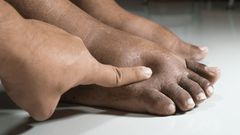Many expecting mothers across Nigeria, Ghana, and West Africa have asked: why do a woman’s feet swell during pregnancy, usually at a certain stage? Should they be worried, or is this just another part of the pregnancy experience?
Swollen feet—known in medical terms as edema—are a fairly common phenomenon faced by women during pregnancy, particularly as they enter the later stages. While it can sometimes be uncomfortable or alarming, experts say that in most cases, it’s a normal physiological response. According to Lagos-based gynaecologist Dr. Adaobi Umeh, swelling tends to begin in the second trimester and becomes especially noticeable during the third trimester as the baby grows larger and exerts more pressure on the mother’s body. However, there are certain warning signs pregnant women should not ignore (more on that below).
Understanding Swelling During Pregnancy: The Local and Global Picture
Why Do Pregnant Women Experience Swollen Feet?
Swelling during pregnancy is not unique to West Africa—it’s a global phenomenon, but our hot and humid climate and day-to-day lifestyle can make it more pronounced here. Understanding the root causes can help expecting mothers and their families manage it more effectively and know when to seek help.
Hormones: The Body in Overdrive
Pregnancy triggers a surge in hormones, particularly progesterone and estrogen, which prepare the body for childbirth and help sustain the growing baby. One major effect of these hormones is a higher retention of water—essential for supporting the expanding blood volume and the developing fetus. Dr. Funmilayo Ogundele, a specialist at the University College Hospital, Ibadan, explains, “It’s perfectly normal for women to retain more fluid at this time. The body is literally working overtime.” This increase in fluid frequently settles in the lower parts of the body due to gravity, leading to that pesky swelling in the feet, ankles, and even fingers.
Heat: Our Weather’s Double-Edged Sword
West African climates are known for their intense heat, especially during the dry season. According to health experts, warmer weather tends to make swelling worse as blood vessels expand and more fluid seeps into surrounding tissues. By the end of the day, after standing or moving about, many pregnant women notice their legs and feet look puffier than they did in the morning. This effect is not limited to Nigeria alone; it is widely reported by pregnant women living across Africa, the Caribbean, and much of the developing world.
Pressure on the Feet: The Baby’s Weight
As the pregnancy advances into the third trimester, the baby approaches its full weight. This growing load increases pressure on the blood vessels in the pelvis and legs. According to Dr. Umeh, “The extra weight can slow the return of blood from the legs back to the heart, which naturally leads to accumulation of fluid in the lower limbs.” The effect isn’t limited to the feet; swelling can also show up in the ankles and, sometimes, hands and face.
Fortunately, most of this swelling is temporary and subsides gradually—usually within a week or two after the baby is born—as the body’s hormones stabilize and excess fluid is flushed out.
![Feet swelling in older women [shuttershock]](https://nowahalazone.com/wp-content/uploads/2025/10/75f45275-b7d0-495d-b94d-1873ddb514db-1.jpg)
Feet swelling in older women [shuttershock]
Pre-eclampsia: When Swelling Signals Something More Serious
Although mild swelling is usually harmless, sudden or severe swelling can indicate a more serious complication called pre-eclampsia. This pregnancy-specific disorder reportedly affects at least 5–8% of pregnancies worldwide, and local obstetricians warn it is a leading cause of maternal and infant mortality if not detected early.
According to Nigeria’s Federal Ministry of Health, pre-eclampsia is marked by high blood pressure and abnormal levels of protein in the urine. The swelling that comes with this condition is often rapid and can affect the face, hands, or feet. If left untreated, it may damage vital organs like the liver, kidneys, lungs, and brain, and may also put the unborn child at risk.
Dr. Kofi Akosah, a Ghanaian maternal health expert, cautions: “Women experiencing headaches, blurry vision, shortness of breath, or a sudden swelling in the face or hands should seek medical attention immediately. Early diagnosis of pre-eclampsia can save lives.”
Tips for Managing and Preventing Swelling
Managing pregnancy-related swelling often comes down to everyday lifestyle choices. Here are practical steps women in Nigeria and across West Africa can take, as advised by health professionals:
- Avoid standing for too long: Try to rest your legs as often as possible, especially after moving about in the heat.
- Wear compression socks: These can help improve circulation and reduce the pooling of fluids in your feet and calves.
- Elevate your legs: Whenever you can, put your feet up—on a pillow or a stool. This helps gravity do its work.
- Limit salt intake: Reducing salty foods may help decrease fluid retention.
- Stay hydrated: Ironically, drinking plenty of fluids can help flush out excess salt and decrease swelling.
- Sleep on your left side: This sleeping position can improve blood flow and relieve pressure on major veins returning blood to your heart.
- Engage in gentle exercise: Activities like walking or swimming (where facilities exist) may improve circulation and reduce swelling.
Traditional remedies such as soaking feet in cool water or using herbal packs are still popular in many local communities, but health experts caution against any home treatments that are not backed by a qualified medical provider, especially in cases of severe swelling.
When to Seek Professional Help
While mild swelling of the feet and ankles is to be expected, it’s crucial to recognize when this common symptom might be something more. Pregnant women should consult a doctor immediately if they experience:
- Sudden swelling in the hands, face, or around the eyes
- Severe or persistent headaches
- Vision changes (blurring or flashes of light)
- Shortness of breath or chest pain
- Very rapid weight gain
These symptoms may be early warning signs of pre-eclampsia or other complications that require urgent care. Access to quality healthcare, including routine antenatal care, is vital for preventing serious outcomes. Nigerian and Ghanaian health ministries have repeatedly urged women to attend all prenatal check-ups to increase their chances of early detection and treatment.
The Bigger Picture: Maternal Health in West Africa
Nigeria and Ghana continue to face maternal health challenges, including limited access to healthcare, late antenatal visits, and cultural factors. According to the World Health Organization (WHO), sub-Saharan Africa contributed over two-thirds of global maternal deaths in 2020, many of which could be prevented through education, better facilities, and community outreach.
Local initiatives, such as mobile clinics and health education campaigns, are helping to close these gaps. Groups like the Nigerian Midwives Service Scheme and Ghana Health Service have started community outreach efforts to teach women about pregnancy symptoms that should never be ignored.
Global Context and Progress
Globally, pregnant women face similar challenges with swelling—known as edema—but the difference often lies in early access to antenatal care and proper health education. While doctors in the UK or US may quickly pick up signs of pre-eclampsia at regular ultrasounds or check-ups, rural clinics in Africa can still struggle with delays and shortages of skilled health workers. Yet, with ongoing investment in maternal care and training, more women across West Africa can safely navigate pregnancy complications, including the sometimes worrying symptom of swelling.
Local Voices: Mothers Share Their Experience
A recent survey of Lagos mothers found that nearly 70% reported some form of swelling during their pregnancies. Abuja mother Amaka I., who gave birth in 2023, recalls, “My ankles became so big in the last month, my slippers couldn’t fit. The midwife told me to rest and prop up my feet when I could.” Similarly, Akosua from Accra noted, “Once I started walking less and drinking more water, things improved, but I always checked with my nurse when in doubt.” Their stories echo across countless Nigerian and West African homes—highlighting the importance of knowledge, support, and timely care.
Key Takeaways
- Some swelling in feet, ankles, and fingers is normal for pregnant women, especially during the second and third trimesters.
- Heat and prolonged standing worsen swelling—rest, hydration, and elevation can help.
- Very sudden, severe, or painful swelling—especially with other symptoms—can warn of serious conditions like pre-eclampsia and always deserves urgent medical attention.
- Routine antenatal visits and community health education are vital to safeguarding the health of mothers and babies across Africa.
Have you or someone you know experienced swelling during pregnancy? What local remedies or tips would you recommend to expecting mothers in Nigeria and across West Africa?
What’s your view on pregnancy-related swelling—did these tips help you, or do you have your own advice to share? Drop a comment below and follow us for more informative updates on women’s health and wellness!
Have a compelling story about pregnancy, women’s health, or your own experience with pregnancy-related symptoms? We’d love to feature your voice!
Email us at story@nowahalazone.com to get your story published or to discuss story sales.
For general questions or support, reach out at support@nowahalazone.com.
Connect with us on Facebook, X (Twitter), and Instagram for the latest updates, tips, and community stories!
Do you have a tip, an opinion, or a story to share? Your perspective could help many others—reach out today!










